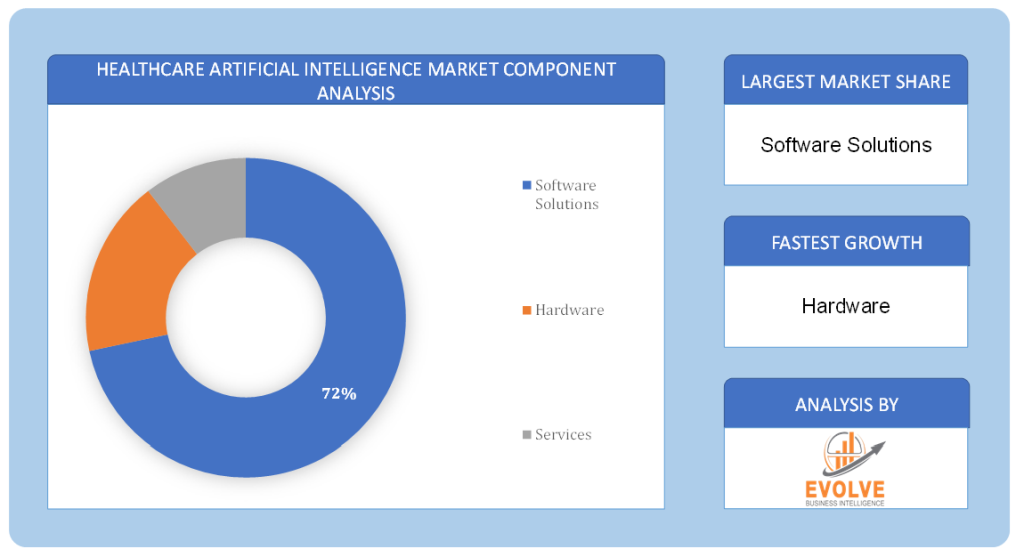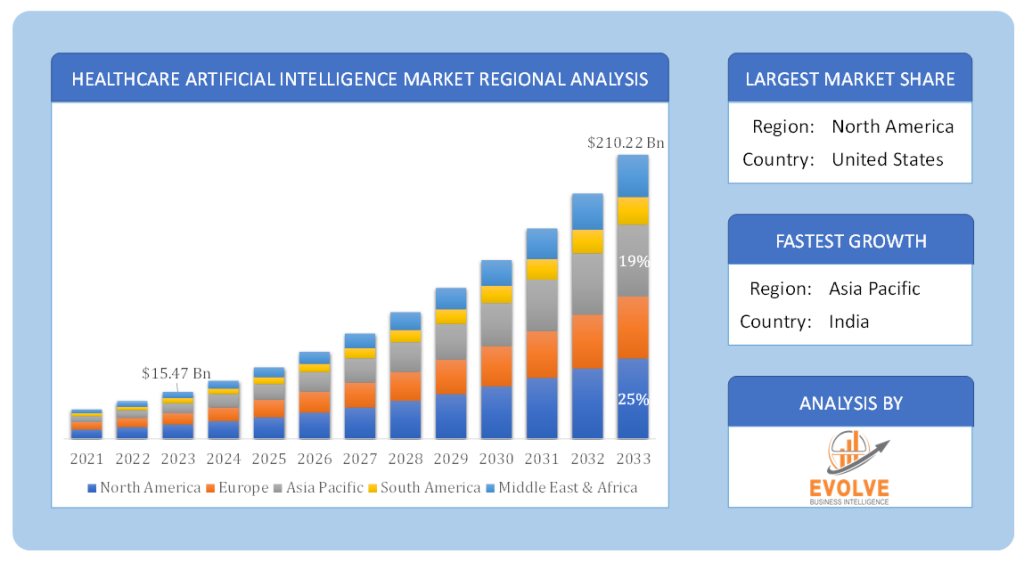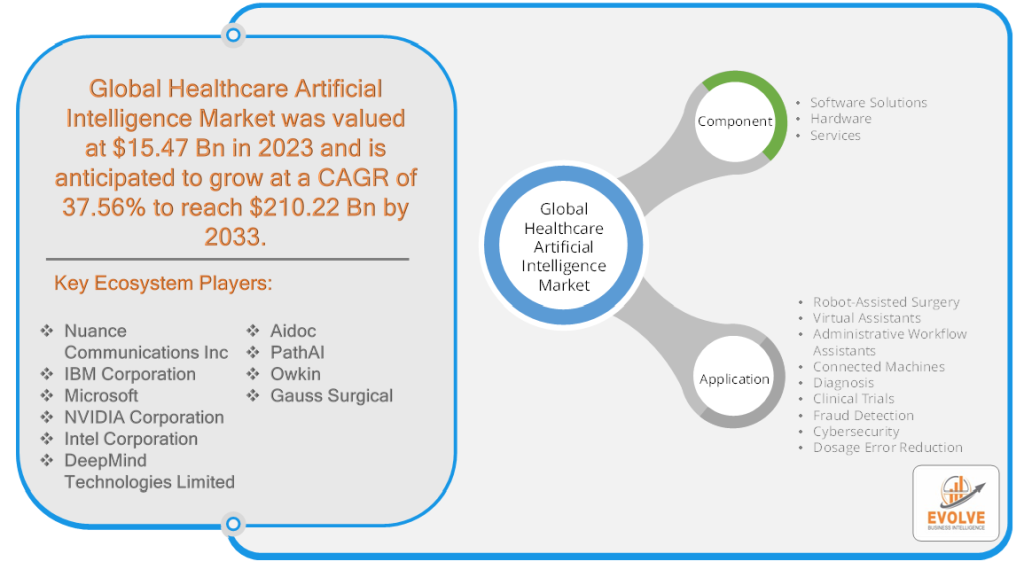Healthcare Artificial Intelligence Market Overview
The Healthcare Artificial Intelligence Market Size is expected to reach USD 210.22 Billion by 2033. The Healthcare Artificial Intelligence industry size accounted for USD 15.47 Billion in 2023 and is expected to expand at a compound annual growth rate (CAGR) of 37.56% from 2023 to 2033. Healthcare Artificial Intelligence (AI) refers to the application of advanced computational algorithms and machine learning techniques within the healthcare industry to analyze complex medical data, assist in clinical decision-making, automate administrative tasks, and improve overall patient care. It involves the development and deployment of AI-based systems and tools that can interpret medical images, extract meaningful insights from patient records, predict disease outcomes, recommend personalized treatment plans, and support healthcare professionals in their diagnostic and therapeutic processes. Healthcare AI encompasses various subfields such as natural language processing, computer vision, deep learning, and predictive modeling. By leveraging large datasets, including electronic health records, genomic data, and medical literature, healthcare AI aims to enhance the accuracy, efficiency, and efficacy of healthcare delivery, ultimately leading to improved patient outcomes, reduced costs, and increased access to quality care. However, it is important to ensure that healthcare AI systems adhere to ethical standards and patient privacy regulations and maintain transparency and interpretability in their decision-making processes.
Global Healthcare Artificial Intelligence Market Synopsis
The Healthcare Artificial Intelligence market was significantly impacted by the COVID-19 pandemic, experiencing both challenges and opportunities. On one hand, the pandemic highlighted the need for innovative and efficient healthcare solutions, leading to an increased demand for AI technologies in various healthcare settings. AI-powered tools such as telemedicine platforms, remote patient monitoring systems, and AI-based diagnostic tools gained prominence as they offered solutions to mitigate the strain on healthcare systems and facilitate remote care delivery. The pandemic also accelerated the adoption of AI-driven solutions in vaccine development, drug discovery, and epidemiological modeling, aiding in the search for effective treatments and strategies to combat the virus. However, the pandemic also presented obstacles such as disruptions in supply chains, delays in clinical trials, and challenges in data collection and validation, impacting the development and implementation of healthcare AI solutions.
Healthcare Artificial Intelligence Market Dynamics
The major factors that have impacted the growth of Healthcare Artificial Intelligence are as follows:
Drivers:
Rapid technological advancements
Rapid technological advancements and increased data availability are major drivers of the Healthcare Artificial Intelligence market. The continuous development and refinement of AI algorithms, machine learning models, and computational power enable a more sophisticated analysis of healthcare data. Additionally, the growing availability of electronic health records, wearable devices, and medical imaging data provides a vast and diverse dataset for AI applications in healthcare. These advancements allow for more accurate diagnostics, personalized treatment plans, and improved patient monitoring, driving the adoption and growth of Healthcare AI.
Restraint:
- Concern over data privacy and security
Healthcare data is highly sensitive and subject to strict privacy regulations, such as the Health Insurance Portability and Accountability Act (HIPAA) in the United States. The collection, storage, and processing of patient data for AI applications raise concerns regarding data breaches, unauthorized access, and potential misuse. Ensuring robust security measures, data anonymization techniques, and compliance with privacy regulations are crucial challenges that need to be addressed to build trust and adoption of Healthcare AI solutions.
Opportunity:
Improving healthcare accessibility and Bridging the Healthcare Gap
An opportunity for the Healthcare Artificial Intelligence market lies in improving healthcare accessibility and bridging the healthcare gap. AI technologies have the potential to overcome geographical barriers and address the shortage of healthcare professionals in certain regions. Through telemedicine platforms, remote monitoring systems, and AI-powered chatbots, patients in underserved areas can access quality healthcare services and receive timely medical advice. AI can also facilitate personalized healthcare delivery, taking into account factors such as patient preferences, socioeconomic background, and cultural differences. By leveraging Healthcare AI, healthcare organizations can enhance the reach and effectiveness of healthcare services, ensuring better health outcomes for populations that face limited access to traditional healthcare facilities.
Healthcare Artificial Intelligence Segment Overview
By Component
 Based on Components, the market is segmented based on Software Solutions, Hardware, and Services. The Software Solutions segment is expected to witness significant growth during the forecast period. There is a rising demand for advanced software applications that can process and analyze large volumes of healthcare data efficiently. Healthcare providers are seeking AI-based software solutions that can assist in clinical decision-making, improve diagnostics accuracy, and automate administrative tasks.
Based on Components, the market is segmented based on Software Solutions, Hardware, and Services. The Software Solutions segment is expected to witness significant growth during the forecast period. There is a rising demand for advanced software applications that can process and analyze large volumes of healthcare data efficiently. Healthcare providers are seeking AI-based software solutions that can assist in clinical decision-making, improve diagnostics accuracy, and automate administrative tasks.
By Application
Based on Application, the market has been divided into Robot-Assisted Surgery, Virtual Assistants, Administrative Workflow Assistants, Connected Machines, Diagnosis, Clinical Trials, Fraud Detection, Cybersecurity, and Dosage Error Reduction. The Robot-Assisted Surgery industry dominates the Healthcare Artificial Intelligence Market. Robot-assisted surgery, which combines AI and robotics to assist surgeons in performing complex procedures with precision and efficiency, has indeed gained prominence and demonstrated significant advancements. However, it is crucial to recognize that other segments within the Healthcare AI market, such as AI-powered diagnostics, predictive modeling, and remote patient monitoring, also play a substantial role and contribute to the overall growth and impact of AI in healthcare.
Global Healthcare Artificial Intelligence Market Regional Analysis
Based on region, the global Healthcare Artificial Intelligence market has been divided into North America, Europe, Asia-Pacific, the Middle East & Africa, and Latin America. North America is projected to dominate the use of the Healthcare Artificial Intelligence market followed by the Asia-Pacific and Europe regions.
 North America Market
North America Market
North America holds a dominant position in the Healthcare Artificial Intelligence (AI) market. The region has been at the forefront of technological advancements and innovation in healthcare, making it a key player in the adoption and development of AI in the industry. Several factors contribute to North America’s dominant position in the Healthcare AI market. Firstly, the region has a well-established healthcare infrastructure and a high level of investment in research and development. This provides a conducive environment for the implementation and integration of AI technologies into existing healthcare systems. Additionally, North America has a strong presence of major technology companies, startups, and academic institutions that are actively involved in AI research and development. These organizations are driving innovation in Healthcare AI, developing advanced algorithms, and creating AI-powered solutions that cater to various healthcare needs.
Asia-Pacific Market
The Asia-Pacific region has emerged as the fastest-growing market for the Healthcare Artificial Intelligence industry. This region has witnessed significant advancements and adoption of AI technologies in healthcare in recent years. Several factors contribute to the rapid growth of the Healthcare AI market in the Asia-Pacific region. Firstly, the region has a large and diverse population, which presents unique healthcare challenges and demands innovative solutions. Healthcare AI can help address these challenges by improving diagnostics, personalized treatment plans, and healthcare delivery efficiency. Secondly, the Asia-Pacific region has seen a surge in healthcare investments, both from the public and private sectors, aimed at modernizing healthcare infrastructure and adopting cutting-edge technologies. This has created a favorable environment for the growth of Healthcare AI, with increased funding for AI startups, research, and development.
Competitive Landscape
The global Healthcare Artificial Intelligence market is highly competitive, with numerous players offering a wide range of software solutions. The competitive landscape is characterized by the presence of established companies, as well as emerging startups and niche players. To increase their market position and attract a wide consumer base, the businesses are employing various strategies, such as product launches, and strategic alliances.
Prominent Players:
- Nuance Communications Inc
- IBM Corporation
- Microsoft
- NVIDIA Corporation
- Intel Corporation
- DeepMind Technologies Limited
- Aidoc
- PathAI
- Owkin
- Gauss Surgical
Key Development
In September 2022, AiCure unveiled its clinical site services program inauguration. This novel initiative extends comprehensive support to sites by overseeing key performance indicators (KPIs) encompassing adherence, compliance, data management, and technology utilization among study participants. By implementing this solution, AiCure empowers research coordinators with proactive insights into patient demographics, thereby mitigating risks across studies and enhancing workflow efficiency.
Scope of the Report
Global Healthcare Artificial Intelligence Market, by Component
- Software Solutions
- Hardware
- Services
Global Healthcare Artificial Intelligence Market, by Application
- Robot-Assisted Surgery
- Virtual Assistants
- Administrative Workflow Assistants
- Connected Machines
- Diagnosis
- Clinical Trials
- Fraud Detection
- Cybersecurity
- Dosage Error Reduction
Global Healthcare Artificial Intelligence Market, by Region
- North America
- US
- Canada
- Mexico
- Europe
- UK
- Germany
- France
- Italy
- Spain
- Benelux
- Nordic
- Rest of Europe
- Asia Pacific
- China
- Japan
- South Korea
- Indonesia
- Austalia
- Malaysia
- India
- Rest of Asia Pacific
- South America
- Brazil
- Argentina
- Rest of South America
- Middle East & Africa
- Saudi Arabia
- UAE
- Egypt
- South Africa
- Rest of Middle East & Africa
| Parameters | Indicators |
|---|---|
| Market Size | 2033: $210.22 Billion |
| CAGR | 37.56% CAGR (2023-2033) |
| Base year | 2022 |
| Forecast Period | 2023-2033 |
| Historical Data | 2021 |
| Report Coverage | Revenue Forecast, Competitive Landscape, Growth Factors, and Trends |
| Key Segmentations | Component, Application |
| Geographies Covered | North America, Europe, Asia-Pacific, Latin America, Middle East, Africa |
| Key Vendors | Nuance Communications Inc, IBM Corporation, Microsoft, NVIDIA Corporation, Intel Corporation, DeepMind Technologies Limited, Aidoc, PathAI, Owkin, Gauss Surgical |
| Key Market Opportunities | • Advancements in machine learning and deep learning • Increasing prevalence of chronic diseases |
| Key Market Drivers | • Increasing demand for personalized healthcare • Growing adoption of big data in healthcare |
REPORT CONTENT BRIEF:
- High-level analysis of the current and future Healthcare Artificial Intelligence market trends and opportunities
- Detailed analysis of current market drivers, restraining factors, and opportunities in the future
- Healthcare Artificial Intelligence market historical market size for the year 2021, and forecast from 2023 to 2033
- Healthcare Artificial Intelligence market share analysis at each product level
- Competitor analysis with detailed insight into its product segment, Government & Defense strength, and strategies adopted.
- Identifies key strategies adopted including product launches and developments, mergers and acquisitions, joint ventures, collaborations, and partnerships as well as funding taken and investment done, among others.
- To identify and understand the various factors involved in the global Healthcare Artificial Intelligence market affected by the pandemic
- To provide a detailed insight into the major companies operating in the market. The profiling will include the Government & Defense health of the company’s past 2-3 years with segmental and regional revenue breakup, product offering, recent developments, SWOT analysis, and key strategies.
Frequently Asked Questions (FAQ)
What is the growth rate of the global Healthcare Artificial Intelligence market?
The global Healthcare Artificial Intelligence market is growing at a CAGR of 37.56% over the next 10 years
Thich region has the highest growth rate in the market of Healthcare Artificial Intelligence?
Asia Pacific is expected to register the highest CAGR during 2023-2033
Which region has the largest share of the global Healthcare Artificial Intelligence market?
North America holds the largest share in 2022
Who are the key players in the global Healthcare Artificial Intelligence market?
Nuance Communications Inc, IBM Corporation, Microsoft, NVIDIA Corporation, Intel Corporation, DeepMind Technologies Limited, Aidoc, PathAI, Owkin, and Gauss Surgical are the major companies operating in the market.
Do you offer Post Sale Support?
Yes, we offer 16 hours of analyst support to solve the queries
Do you sell particular sections of a report?
Yes, we provide regional as well as country-level reports. Other than this we also provide a sectional report. Please get in contact with our sales representatives.








